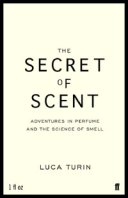 Understanding how smell works is a bit like trying to fix a radio, with the premise that a) you have little knowledge of its components, and b) the darn thing didn't come with a wiring diagram. For seven decades, scientists have explored the various components of the olfactory system, and how they are connected to each other. But despite their hard work, the fundamental question has remained unanswered: how does our nose 'read' odorant molecules? Biochemist and perfume connoisseur Luca Turin thinks he cracked the code, and wrote a book about it: The Secret of Scent.
Understanding how smell works is a bit like trying to fix a radio, with the premise that a) you have little knowledge of its components, and b) the darn thing didn't come with a wiring diagram. For seven decades, scientists have explored the various components of the olfactory system, and how they are connected to each other. But despite their hard work, the fundamental question has remained unanswered: how does our nose 'read' odorant molecules? Biochemist and perfume connoisseur Luca Turin thinks he cracked the code, and wrote a book about it: The Secret of Scent.
If you've read Chandler Burr's The Emperor of Scent (2003), you're familiar with the basics of Turin's theory of olfaction: the nose works like a spectroscope, measuring the vibration of molecules to determine their smell. In The Secret of Scent, Turin reintroduces his vibration theory to the public, offering a personal perspective on how he got there, and where his work stands today. The systematical explanation of his findings is clearly directed to a layman's audience, starting with the principles of chemistry (atoms and molecules) and biology (enzymes and proteins), which also serve as the "white coat" basics of perfumery. This essential prelude is followed by an extensive analysis of the relationship between molecular structure and odour, and of the binding mechanisms between smell receptors and molecules. Problems with conventional 'lock and key' mechanisms are discussed, in which mirror-image versions of odorant molecules play a crucial role. Starting from these premises, Turin goes back to Malcolm Dyson's theory of molecular vibration (1938), and carefully illustrates how other researchers gradually paved the way for his own ambitious project.
The chemistry lingo in The Secret of Scent is cleverly mixed with down-to-earth observations and evocative comparisons; the result is a comprehensive and accessible lecture on the principles of smell. I see Luca Turin as a diabolical crossover between Richard Feynman and Jeremy Clarkson: his contagious enthusiasm in bringing science to life never fails to amaze me. Should I ever remember the name allyl amyl glycolate, it will trigger immanent visions of Olivia Newton-John's Physical.
There are obvious parallels between The Secret of Scent and The Emperor of Scent; in fact, browsing through Burr's book again, I discovered more similarities than I initially recalled. But is it really a problem if Turin repeats how a gas chromatograph works? Personally, I don't think so. These books were written from different angles, with Turin staying clear from conspiracy theories, allegations of scientific corruption, or personal tribulations. The Secret of Scent stands on its own as a valuable read, and the author — whether he effectively cracked the code of smell or not — deserves praise for bringing this scientific puzzle to the attention of a larger audience.
The Secret of Scent: Adventures in Perfume and the Science of Smell
London: Faber & Faber (2006)
Paperback, 194 pages
The Secret of Scent is available from May 18th in the UK; a US edition is expected in November.
Luca Turin (1953) is a biophysicist. Since 2003, he has been the Chief Technology Officer at Flexitral .
My copy is already on order from Amazon.com!
but not french version?
i'm sad
My edition is on order already from the UK Amazon, and now I'm really on pins and needles for it to arrive already! Thank you so much for the sneak preview.
It's so funny you mention Feynman – he is one of my favorites, and who knows, perhaps this is also one of the reasons Turin is one of my favorites to read as well. Very astute comparsion Marcello, I can only nod in agreement with you.
hi Katie, I guess you'll be pleased to know that my reference to Feynman was no coincidence… Turin actually refers to him in the book, when he discusses atoms and molecules. But the comparison is mine indeed 🙂